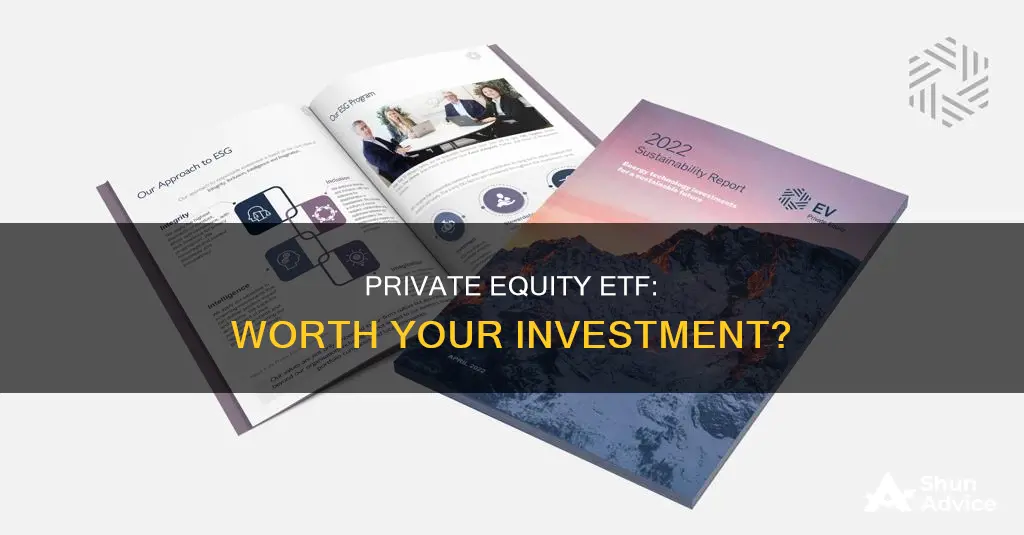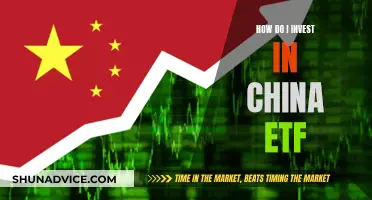
Private equity exchange-traded funds (ETFs) are an increasingly popular investment option, but what exactly are they, and are they worth investing in? Private equity involves investing in companies that are not publicly traded on the stock market. Private equity firms buy a significant portion of a company or the whole business, improve its performance, and then sell it at a higher price. ETFs that trade on exchanges allow investors to access this market and invest in private equity and related firms. Private equity ETFs are attractive because they offer diversification and the potential for high returns. However, they are also financially complicated and considered high-risk. Private equity fees are also very high, and some experts warn that private equity is not an asset class and should be avoided, especially by retail investors. So, should you invest in private equity ETFs? The answer depends on your individual circumstances and risk appetite. It's essential to do your research and understand the potential benefits and drawbacks before deciding.
| Characteristics | Values |
|---|---|
| High-Risk Investment | Investors should be prepared to lose all the money they invest |
| Diversification | Private equity can help diversify a portfolio by mitigating public market risk and cyclical risk |
| Returns | Historically, private equity has exhibited returns similar to emerging market equities and higher than all other traditional asset classes |
| Volatility | Private equity is considered a less volatile asset class |
| Dividends | Private equity can offer relatively higher dividends |
| Accessibility | Private equity is opening up to more individual investors |
| Fees | Private equity fees are very high |
| Active Management | Private equity firms take on a level of active ownership, working to improve the company's performance |
What You'll Learn

Private equity vs public equity
Private equity and public equity are two different options for companies to raise capital and attract investors. They differ in terms of their structure, investor base, liquidity, risk, and regulatory requirements.
Investor Base
Private equity refers to an investment in a private company that is not publicly traded. It is often done through private equity funds that cater to high-net-worth investors or accredited investors. These investors typically need to meet certain minimum requirements for net worth. On the other hand, public equity refers to ownership in publicly traded companies, which are available to anyone with an investment or brokerage account.
Liquidity
Public equity offers higher liquidity as most publicly traded stocks are easily traded daily through public market exchanges. In contrast, private equity has lower liquidity due to the absence of formal exchanges or secondary markets.
Risk
Private equity is considered a high-risk investment as it often involves investing in startups or less mature businesses. The higher risk is accompanied by the potential for higher returns. Public equity, on the other hand, is generally considered a lower-risk investment, especially when investing in well-diversified portfolios.
Regulatory Requirements
Private equity investments are subject to fewer regulatory requirements and reporting obligations compared to public equity. Private companies have more flexibility in managing their distributions and equity, and they are not required to comply with regulations such as the Sarbanes-Oxley anti-fraud law.
Structure
Public equity investments are typically structured as common or preferred stock shares. Investors can own shares directly or through mutual funds or exchange-traded funds (ETFs). Private equity investments, on the other hand, are usually structured as non-voting common shares. Investors often acquire these shares through a stake in a private equity fund, which is set up as a limited partnership.
Returns
Private equity funds actively manage their portfolios and charge higher management fees. They aim to generate higher returns by investing in companies with high growth potential and taking an active role in their management. Public equity funds, on the other hand, may have lower fees but typically reinvest profits back into the fund rather than distributing them to investors.
In summary, private equity offers the potential for higher returns but is available only to accredited investors and carries higher risk and lower liquidity. Public equity, on the other hand, is more accessible, has lower fees and risk, and offers higher liquidity but may provide lower returns.
Bito ETF: Worth the Investment Risk?
You may want to see also

Pros and cons of investing in private equity
Private equity investments have the potential to generate higher returns than traditional investments due to the higher risk involved. They can be an attractive option for investors looking to diversify their portfolios. However, before investing, it's critical to consider whether it aligns with your financial goals and risk tolerance. Here are some pros and cons of investing in private equity:
Pros:
- Higher potential returns: Private equity firms aim to identify opportunities with growth potential and provide capital, strategic guidance, and operational expertise to help them succeed. If the company performs well, investors can realise significant returns.
- Diversification: Private equity can benefit a portfolio as it is typically not correlated with traditional investments. By adding private equity, investors can reduce overall portfolio risk and potentially enhance returns.
- Active involvement: Private equity investors can actively participate in the growth and development of their invested companies. This level of connectivity can be exciting for investors passionate about a particular industry or those seeking transparency in how their investment dollars are applied.
- Access to unique opportunities: Private equity offers access to emerging technologies, disruptive business models, real estate development, and other untapped markets by investing in private companies.
Cons:
- Illiquidity: Private equity investments lock up investor funds for a certain period, requiring a long-term investment horizon. Investors must be willing to hold their investments for years.
- Higher risk: Private equity often involves significant risks, including the potential loss of the entire investment. While due diligence can assess viability and microeconomic risks, external factors like political instability, economic recession, or health crises may impact success.
- Limited information: Private companies are not subject to the same financial disclosure requirements as publicly traded companies, making the investment success highly dependent on the underlying company's performance. Private equity funds may also invest in early-stage companies without a proven track record.
A Beginner's Guide: Investing in ETFs via ICICI Direct
You may want to see also

Private equity ETFs available in the market
Private equity exchange-traded funds (ETFs) are a way for investors to access private equity investments without directly investing in them. Private equity companies are not listed on the stock exchange, and as such, they are not directly investable for ETF investors. However, some large private equity companies are listed and raise capital on the equity market, and these can be aggregated in an index that underlies an ETF.
Some of the most popular private equity ETFs available in the market include:
- Invesco Global Listed Private Equity Portfolio (PSP): With assets totalling over $267 million as of February 2022, PSP is the largest private equity ETF. It provides investors with global exposure to approximately 70 publicly-listed private equity companies worldwide, including business development companies and financial institutions. The expense ratio for this fund is 1.44%, and it offers a high distribution yield of 11.34%.
- ProShares Global Listed Private Equity ETF (PEX): Issued by ProShares, this fund aims to provide investors with results similar to the performance of the LPX Direct Listed Private Equity Index. It includes approximately 30 publicly-listed private equity companies. With an asset base of $26 million as of February 2022, it offers global diversity and a distribution yield of 14.31%. However, it has a relatively high expense ratio of 3.31%.
- IShares Listed Private Equity UCITS ETF USD (Dist)IE00B1TXHL60
- Xtrackers LPX MM Private Equity Swap UCITS ETF 1CLU0322250712
- FlexShares Listed Private Equity UCITS ETFIE0008ZGI5C1
- IShares Listed Private Equity UCITS ETF USD (Acc)IE000D8FCSD8
Mongolia ETF: A Guide to Investing in the Country's Future
You may want to see also

How to choose the right private equity ETF
Private equity exchange-traded funds (ETFs) are a great way to gain exposure to private equity investments, which can offer significant and attractive returns. Private equity ETFs are a less volatile asset class that can provide stable returns and higher dividends. When choosing a private equity ETF, here are some key factors to consider:
- Geographical Diversification: Private equity ETFs offer diversification across different geographical regions, such as North America, Europe, and Asia. Consider your desired level of global exposure and choose an ETF that aligns with your preferences.
- Index and Performance: Consider the underlying index and performance of the ETF. Compare the track records of different ETFs and evaluate their historical returns. Look at factors such as size, cost, age, income, domicile, and replication method to make an informed decision.
- Expense Ratio and Distribution Yield: The expense ratio represents the ongoing fee you will pay to manage your investment. A higher expense ratio means higher fees. Compare the expense ratios of different ETFs and choose one that aligns with your budget. Also, consider the distribution yield, which represents the income you can expect to receive from your investment.
- Company Exposure: Evaluate the holdings of the ETF and assess the concentration of investments in different companies and regions. Ensure that the ETF provides exposure to companies that align with your interests and investment goals.
- Risk and Return: Private equity investments are considered high-risk ventures. Be prepared to lose all the money you invest, and only invest what you can afford to lose. While private equity has the potential for higher returns, it is important to carefully consider your risk tolerance and financial goals.
- Fees and Charges: Private equity fees tend to be relatively high compared to public equity funds. Evaluate the fees and charges associated with different ETFs, as these can significantly impact your net returns over time. Choose an ETF with a fee structure that you are comfortable with and ensure you understand all the costs involved.
Remember, when investing in private equity ETFs, it is essential to conduct thorough research and due diligence. Consider seeking advice from a financial advisor or consultant to ensure that you make informed investment decisions.
ETFs: Smart Single Investment or Risky Business?
You may want to see also

Risks and considerations for private equity investors
Private equity is an investment category that deploys capital to private companies that are not publicly traded on stock exchanges. Private equity firms gather large sums of money to buy either a significant portion of a company or the whole business. They then work to improve the company's performance, aiming to sell it later at a higher price.
High Fees and Charges
Private equity fees are relatively high compared to public equity funds. The impact of these fees on investors' net returns can be significant over time. It is essential to consider the cost when investing in private equity funds, as it is one of the most reliable predictors of future fund performance.
Illiquidity and Lack of Protection
Private equity investments are typically illiquid, meaning they are difficult to sell quickly without losing value. Private equity is also a high-risk investment, and you are unlikely to be protected if something goes wrong.
Subjective Valuation
Private equity funds are valued "offline" by third parties, and only every six months or so. The valuation of unlisted and illiquid assets can be highly subjective, making it challenging to identify funds that will deliver good returns in the future.
Volatility and Market Conditions
While private equity is considered a less volatile asset class, market conditions can still impact the performance of the companies in which private equity firms invest. For example, economic conditions may affect the performance of portfolio companies at a fundamental level.
Diversification
Private equity can help diversify a portfolio by providing exposure to different industries and geographic regions. However, it is important to note that private equity holdings companies are not the same as investing directly in private equity.
Performance and Returns
While private equity has historically outperformed public equity, this may not always be the case. Research has shown that since 2008, exposure to private equity has not contributed to the generation of excess returns by US pension funds. It is essential to consider the potential for lower returns over time due to market conditions and other factors.
Suitability for Retail Investors
Some experts argue that private equity is not suitable for retail investors due to its high fees and illiquid structure. It is crucial to carefully consider your investment goals and risk tolerance before investing in private equity.
A Guide to Investing in Nanc ETF: Tips and Strategies
You may want to see also
Frequently asked questions
Private equity (PE) firms pool capital to invest in private companies, which may come in the form of venture capital (VC) to startups, or by taking over and restructuring mature firms, often via leveraged buyouts (LBOs). Private equity is an investment category that deploys capital to private companies not publicly traded on stock exchanges.
Private equity has historically been considered an attractive investment proposition, with higher returns than other assets. It can also help to diversify against market and cyclical risk. However, it is a high-risk investment and you are unlikely to be protected if something goes wrong. Private equity fees are also very high.
Private equity companies are not directly investable for ETF investors. However, some large private equity companies are themselves listed companies and raise capital on the equity market. The stock price performance of such private equity companies depends largely on the performance of their investment portfolios. Such listed private equity companies can be aggregated in an index that underlies an ETF. Examples of private equity ETFs include PSP and PEX.







